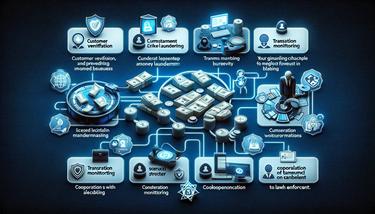What steps are taken to prevent criminal activity and money laundering through the licensed gambling business?
Gambling businesses combat criminal activity and money laundering[1] by implementing comprehensive Anti-Money Laundering (AML) and Know Your Customer (KYC) policies, conducting due diligence checks, and reporting suspicious activities to relevant authorities. The use of advanced analytics and AI for unusual activity detection, along with international cooperation and compliance[2] with the Financial Action Task Force (FATF) recommendations[3], are vital measures.
- Key Facts
- 1. Strict Licensing Requirements
- 2. Know Your Customer (KYC) Procedures
- 3. Anti-Money Laundering (AML) Policies
- 4. Transaction Monitoring Systems
- 5. Cooperation with Regulatory Bodies and Law Enforcement
- 6. Limitations on Cash Transactions
- 7. Regular Audits and Compliance Checks
- 8. Training and Awareness Programs
Key Facts
- Implementation of AML and KYC[4] policies.
- Due diligence checks and reporting of suspicious activities.
- Use of advanced analytics for unusual activity detection.
Licensed gambling businesses operate within a stringent regulatory framework[5] designed to prevent criminal activity, including money laundering. These measures are critical in maintaining the integrity of the gambling industry and protecting it from being exploited for illicit purposes. The steps taken to mitigate these risks are multifaceted, encompassing legal compliance, operational protocols, and advanced technology use. Here’s an overview of the key strategies employed:
1. Strict Licensing Requirements
Before a gambling business can operate legally, it must obtain a license from the relevant regulatory authority[6]. This process involves thorough background checks[7] on the owners and operators to ensure they have no links to criminal activities. Licensing requirements also stipulate that businesses must have robust systems and controls in place to prevent money laundering. This initial vetting process is a crucial first step in safeguarding the industry.
2. Know Your Customer (KYC) Procedures
KYC procedures are essential in the fight against money laundering. Gambling businesses must verify the identity of their customers, understand their gambling behavior, and assess their risk profile. This involves collecting and analyzing personal information, such as name, address, and date of birth, and may require documents like passports or driving licenses. By knowing their customers, businesses can monitor transactions for suspicious activity more effectively.
3. Anti-Money Laundering (AML) Policies
AML policies are central to the regulatory strategies of licensed gambling businesses. These policies include establishing a risk-based approach to customer due diligence, ongoing monitoring of customer transactions, and reporting suspicious activity. Gambling businesses must also ensure they have designated AML officers and provide regular training to staff on recognizing and dealing with potential money laundering activities.
4. Transaction Monitoring Systems
Advanced software systems are deployed to monitor customer transactions in real-time, looking for patterns that may indicate money laundering, such as unusually large bets or withdrawals, frequent transactions within a short period, or inconsistent gambling behavior. These systems can flag suspicious activity, triggering further investigation.
5. Cooperation with Regulatory Bodies and Law Enforcement
Licensed gambling businesses are required to report suspicious activities to financial intelligence units or other designated regulatory bodies. They must cooperate fully with law enforcement agencies during investigations into criminal activities. This collaboration is crucial for the timely identification and prevention of money laundering schemes.
6. Limitations on Cash Transactions
To reduce the risk of money laundering, many gambling establishments impose limits on cash transactions. This may include setting maximum amounts for cash deposits and withdrawals. Some businesses also encourage the use of traceable payment methods, such as credit cards and electronic wallets, which provide a clear audit trail.
7. Regular Audits and Compliance Checks
Regular audits and compliance checks are conducted by regulatory authorities to ensure that gambling businesses adhere to legal requirements and AML protocols. These audits assess the effectiveness of the businesses’ systems and controls in preventing money laundering and may lead to recommendations for improvements or, in cases of non-compliance, sanctions[9].
8. Training and Awareness Programs
Educating staff about the risks of money laundering and how to recognize signs of suspicious activity is vital. Gambling businesses often conduct regular training sessions and establish clear reporting channels for employees to report concerns. This culture of vigilance and responsibility is key to preventing criminal activities.
In conclusion, preventing criminal activity and money laundering in the licensed gambling business requires a comprehensive approach that combines legal compliance, advanced monitoring technology, and a commitment to ethical practices[10]. Through these measures, the industry aims to protect itself and its customers from the risks associated with illicit activities.
- Money Laundering — The process of making large amounts of money generated by a criminal activity appear to be legally obtained.
- Compliance — The act of adhering to legal standards and regulations established by governmental bodies and regulatory agencies, particularly in the context of financial operations and transactions involving cryptocurrencies.
- Financial Action Task Force (FATF) Recommendations — International standards aimed at preventing illegal activities such as money laundering and terrorism financing, with certain recommendations specifically addressing the cryptocurrency sector.
- AML and KYC — Anti-Money Laundering and Know Your Customer regulations aimed at preventing financial crimes by verifying the identity of clients.
- Regulatory Framework — A set of regulations and guidelines established by authorities that govern the operation of financial markets and instruments.
- Regulatory Authority — The governmental or independent body responsible for overseeing, regulating, and licensing gambling activities within a jurisdiction.
- Background Checks — The investigations conducted to assess the suitability and integrity of applicants for gaming licenses, including checks on financial history, criminal records, and business conduct.
- Transaction Monitoring — The continuous oversight of player transactions to identify suspicious patterns that may indicate fraudulent activity or money laundering.
- Sanctions — Penalties imposed on gambling operators for non-compliance with regulatory standards or laws.
- Ethical Practices — The moral principles guiding the conduct of gambling operators, including honesty, integrity, and responsibility.
- Financial Action Task Force. 'Money Laundering and Terrorist Financing in the Gambling Sector.'
- Gambling Commission. 'Anti-money laundering from the Gambling Commission.'


